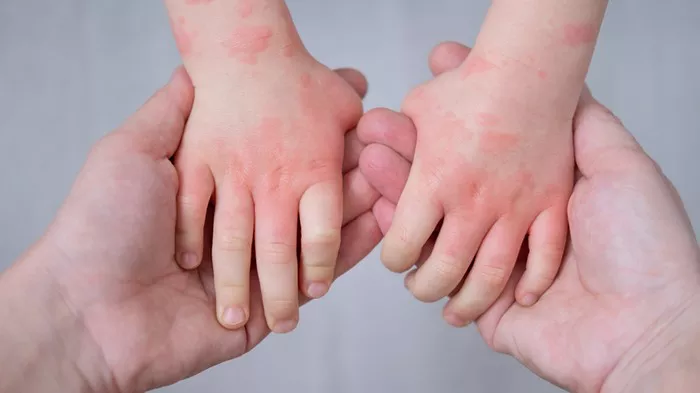Eczema, a chronic inflammatory skin condition, affects millions worldwide, with symptoms often exacerbated during the summer months. While the warmer weather brings joy and outdoor activities, it can also trigger flare-ups for those with eczema. Managing this condition during summer requires a tailored approach to alleviate symptoms and maintain skin health. In this article, we’ll explore the causes of summer eczema and provide comprehensive strategies for its treatment and prevention.
Understanding Summer Eczema
Eczema, also known as atopic dermatitis, is characterized by dry, itchy, and inflamed skin. During summer, several factors contribute to exacerbating eczema symptoms:
1. Heat and Humidity: High temperatures and increased humidity levels can lead to excessive sweating, which irritates sensitive skin and triggers flare-ups.
2. Sun Exposure: While sunlight can have some benefits for eczema by providing vitamin D and reducing inflammation, excessive sun exposure can also worsen symptoms and lead to sunburn, further aggravating the skin.
3. Allergens: Pollen, grass, and mold spores are more prevalent during the summer months, triggering allergic reactions in individuals with eczema.
4. Swimming Pool Chemicals: Chlorine and other chemicals used in swimming pools can strip the skin of its natural oils, leading to dryness and irritation, particularly in individuals with sensitive skin.
Treatment Strategies for Summer Eczema
1. Moisturize Regularly: Hydrating the skin is crucial for managing eczema. Use thick, fragrance-free moisturizers immediately after bathing to lock in moisture. During summer, opt for lighter, non-greasy formulations that won’t exacerbate sweating.
2. Stay Cool: Keep the skin cool to prevent sweating and irritation. Wear loose-fitting, breathable clothing made from natural fibers like cotton. Use air conditioning or fans to maintain a comfortable indoor environment.
3. Sun Protection: Shield the skin from excessive sun exposure by wearing lightweight clothing that covers affected areas. Apply a broad-spectrum sunscreen with an SPF of 30 or higher, choosing a hypoallergenic, fragrance-free formula suitable for sensitive skin.
4. Avoid Triggers: Identify and avoid triggers that worsen eczema symptoms. This may include certain fabrics, harsh soaps or detergents, and specific foods that can cause allergic reactions.
5. Cool Baths: Take cool baths or showers to soothe inflamed skin and alleviate itching. Avoid hot water, which can further dry out the skin.
6. Topical Treatments: Over-the-counter hydrocortisone creams or ointments can help reduce inflammation and itching during flare-ups. For severe cases, your doctor may prescribe topical corticosteroids or calcineurin inhibitors.
7. Antihistamines: Oral antihistamines can help alleviate itching and promote better sleep, particularly if eczema symptoms worsen at night.
8. Manage Stress: Stress can exacerbate eczema symptoms, so practice stress-reduction techniques such as mindfulness, meditation, or yoga to help manage flare-ups.
9. Hydrate from Within: Drink plenty of water to stay hydrated from the inside out. Proper hydration supports overall skin health and can help prevent dryness and itching.
10. Consult a Dermatologist: If your eczema symptoms persist or worsen despite home remedies, seek advice from a dermatologist. They can provide personalized treatment recommendations, including prescription medications or phototherapy.
Preventing Summer Eczema Flare-ups
Prevention is key to managing summer eczema effectively. Here are some additional tips to minimize flare-ups:
1. Limit Outdoor Activities: Avoid prolonged exposure to heat and humidity, especially during peak hours when the sun’s rays are strongest.
2. Choose Skin-Friendly Activities: Opt for indoor or shaded activities during hot weather, such as indoor sports or arts and crafts.
3. Protective Clothing: Wear lightweight, long-sleeved shirts, pants, and wide-brimmed hats to shield the skin from the sun and minimize contact with allergens.
4. Stay Informed: Monitor pollen counts and air quality forecasts, and plan outdoor activities accordingly to reduce exposure to allergens.
5. Skincare Routine: Stick to a consistent skincare routine, using gentle cleansers and moisturizers suitable for sensitive skin.
6. Avoid Harsh Chemicals: Choose gentle laundry detergents and avoid fabric softeners or dryer sheets that may contain irritating ingredients.
7. Keep Indoor Environment Clean: Regularly vacuum and dust your home to minimize exposure to dust mites and other indoor allergens.
8. Stay Cool at Night: Use lightweight bedding and keep the bedroom cool to prevent night sweats and discomfort.
By implementing these strategies, individuals with eczema can effectively manage their symptoms and enjoy a more comfortable summer season. Remember that consistency is key, and it may take some trial and error to find the combination of treatments that works best for you. Always consult with a healthcare professional for personalized advice and guidance on managing your eczema. With proper care and attention, you can keep your skin healthy and minimize the impact of summer eczema flare-ups.
























